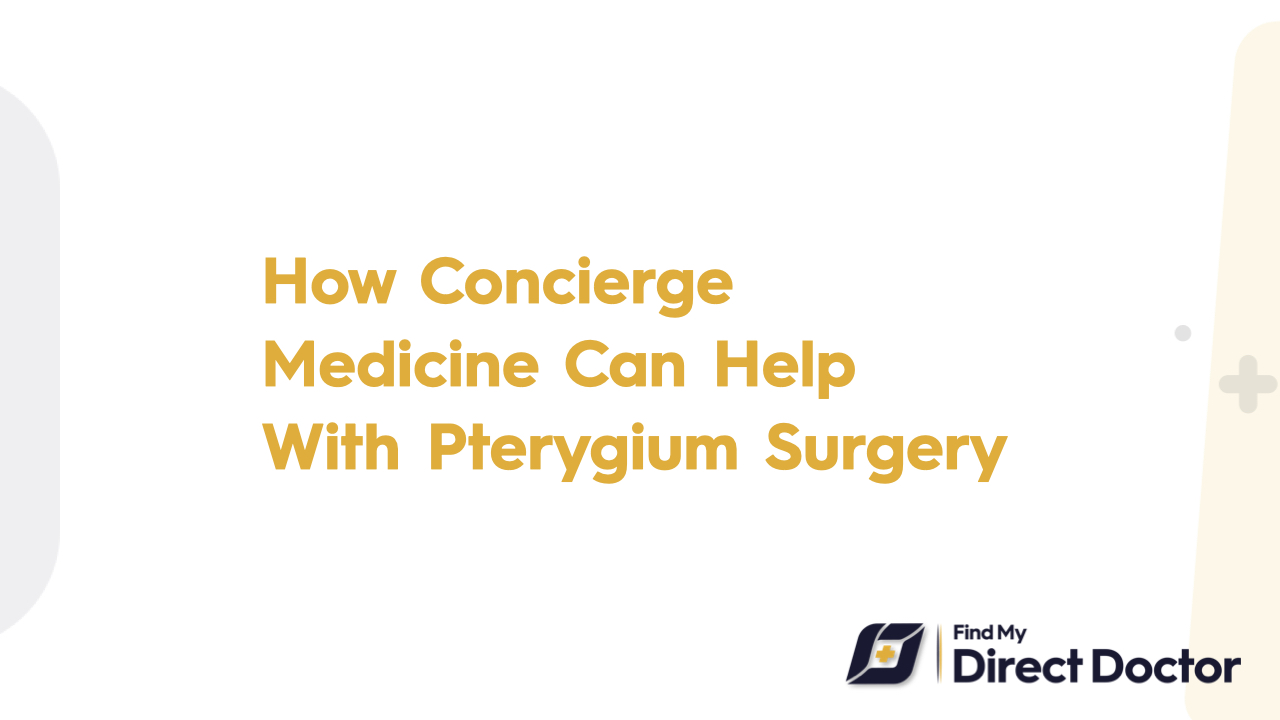



In pterygium surgery, a growth of tissue is removed from the conjunctiva of the eye that can extend over the cornea. Pterygiums are typically removed when they cause discomfort, interfere with vision, or appear unsightly. In order to improve the overall experience and outcome for patients with pterygium surgery, concierge medicine provides enhanced personalized care and attention.

As part of concierge medicine, pterygium surgery is performed with a higher level of individualized care. It is beneficial for patients to have extended consultation times with their ophthalmologist, so that their concerns and preferences can be discussed in detail. In this way, all aspects of the procedure are explained clearly and tailored to meet the patient's needs. In the concierge model, a more comprehensive pre-surgical evaluation is possible, including detailed assessments and personalized planning.
Furthermore, concierge medicine offers high levels of convenience and accessibility. Patients in a concierge practice often experience shorter wait times for appointments and greater flexibility in scheduling, which can reduce stress and enhance overall satisfaction with the surgical process. Constante ophthalmologists typically provide more frequent communication and follow-up, providing a supportive and responsive environment throughout the procedure.
Pterygium surgery patients can benefit from concierge medicine in a number of ways. One of the primary advantages is the enhanced level of personalized care that patients receive. Patients are not just another case in a concierge setting; they are unique individuals with unique needs and preferences. Concierge ophthalmologists take the time to learn about a patient's specific condition, concerns, and expectations, resulting in tailored surgical approaches that maximize success rates.
In addition to its continuity of care, concierge medicine offers patients the opportunity to establish a long-term relationship with their ophthalmologist, who becomes familiar with their medical history and personal circumstances over time. By maintaining continuity, the surgeon is able to provide a more personalized surgical plan and improve decision-making. The follow-ups after surgery are also more frequent and attentive, allowing for prompt management of any issues that may arise and ensuring a smooth recovery.
Furthermore, concierge medicine provides patients with a more supportive and comfortable atmosphere. Personalized care means that patients receive more time and attention from their healthcare provider, which can reduce anxiety and provide reassurance during surgery. Concierge care often includes additional services such as pre-surgical education, stress management, and post-surgery support, all of which contribute to a more positive and comprehensive experience.
Getting ready for pterygium surgery in a concierge medicine setting requires a thorough and customized approach. A detailed pre-surgical assessment is conducted in advance of the procedure, which includes an evaluation of the patient's eye health and a discussion of their specific concerns and goals. By assessing the patient's unique needs, the concierge ophthalmologist can tailor the surgical plan to meet their individual needs, ensuring all factors are taken into account.
In a concierge practice, patients receive detailed information about what to expect before, during, and after surgery, as well as instructions on how to prepare for it. Patients feel more informed and prepared with this education, which reduces anxiety and enhances their overall experience. Additionally, patients are often able to ask questions and discuss their concerns in depth, enhancing their understanding and confidence.
After the surgery, concierge medicine patients receive close follow-up care to monitor their healing progress and address any concerns they may have. The concierge ophthalmologist is readily available for consultations and provides ongoing support to manage postoperative care. As a result of this level of attention, any potential complications are addressed promptly and the patient's recovery is smooth.
Moreover, concierge medicine often includes access to additional support services during recovery, including specialized follow-up appointments, customized rehabilitation plans, and access to ancillary healthcare providers. This ensures that patients have a more supportive and comprehensive recovery experience following pterygium surgery.
A concierge medicine approach to pterygium surgery is distinctive and advantageous because it focuses on personalized care, enhanced accessibility, and comprehensive support throughout the procedure. Among the benefits of this model are tailored treatment plans, continuity of care, and a more comfortable and supportive environment, all of which contribute to a better and more effective experience for patients undergoing pterygium surgery.